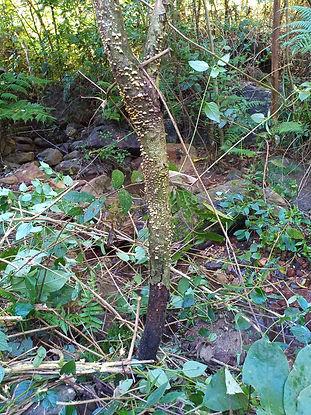Herbicide-free
If you found some unwanted plants in your vegetable patch, you wouldn't spray herbicide on them, knowing that toxins would end up in your food, would you? We wouldn't knowingly poison ourselves, would we? So why should it be ok to spray those same chemicals onto other beings' food? Humans are very good at looking after themselves, but I feel we often don't apply the same rules to the plants, animals and soil we say that we care for.
Permaculturalist and anti-"war-on-weeds" activist Tao Orion says that "though most common herbicides are considered benign or nontoxic, there is significant evidence pointing to the opposite conclusion. Important questions regarding their potential toxicity to a wide variety of organisms, unknown interactions with soil microorganisms, residual effects on desired vegetation, and synergistic effects of their mixtures remain unexplored."1
Many people are aware of a report by the International Agency on Research into Cancer (IARC is a branch of the World Health Organisation) from 2015 which concluded that glyphosate, the most commonly used herbicide worldwide, was "probably carcinogenic to humans. This was based on “limited” evidence of cancer in humans (from real-world exposures that actually occurred) and “sufficient” evidence of cancer in experimental animals (from studies of “pure” glyphosate). IARC also concluded that there was “strong” evidence for genotoxicity, both for “pure” glyphosate and for glyphosate formulations. The IARC Monographs evaluation is based on the systematic assembly and review of all publicly available and pertinent studies, by independent experts, free from vested interests. It follows strict scientific criteria, and the classification system is recognized and used as a reference all around the world. This is because IARC evaluations are based on independent scientific review and rigorous criteria and procedures. "2
But why should IARC have to clarify how rigorous and independent their assessment criteria is? I thought all science was supposed to be independent and objective? The answer isn't too hard to find. The corporations that sell herbicides, such as Monsanto, Dow Chemical, Bayer and Du Pont, are required to fund the research of their own product. They also sponsor environmental NGO's such as The Nature Conservancy.3 In Australia, they sponsor and speak at "weed symposiums" of industry and government representatives. Some might call this a conspiracy. But the reality is that there is no conspiracy - herbicide manufacturers and environmental "authorities' don't need to hide their collusion because governments readily provide the means for them to ensure the war on weeds continues, at whatever ecological cost.
Above: Giant Devil's Fig is a Class 3 Noxious Weed in the New South Wales North Coast region. This large specimen has been effectively ringbarked - death took approximately 3 months.
An organic choice is a peaceful protest against that corporate and government collusion. To value health over efficiency. To value the whole system, not just us.
And to live by that precautionary principle: At least, do no harm.
1Beyond the war on Invasive Species, Tao Orion p.36 2015. Chelsea Green Publishing
2IARC Monograph on Glyphosate. Retrieved from https://www.iarc.fr/featured-news/media-centre-iarc-news-glyphosate/ May 2019
3Beyond the war on Invasive Species, Tao Orion p.20 2015. Chelsea Green Publishing
